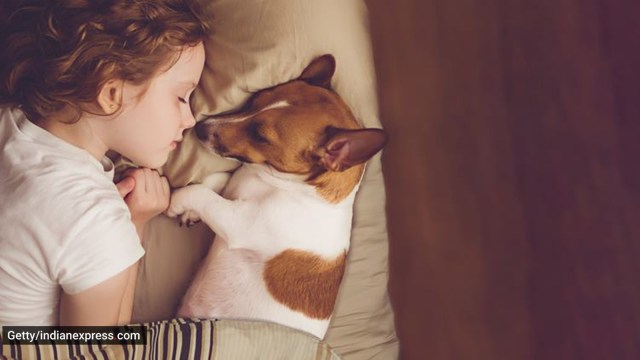- India
- International
It is imperative we teach our kids how to behave around animals
The big takeaway from teaching your children how to behave with empathy and kindness around animals is how they hopefully will behave around people too. And that’s a win-win all the way
 Introducing baby animals to children is one way of making them, bond instantly — but yes, this too has its caveats — and should be done under sensible supervision. (Credit: Getty Images)
Introducing baby animals to children is one way of making them, bond instantly — but yes, this too has its caveats — and should be done under sensible supervision. (Credit: Getty Images)Some weeks ago, a stray dog somehow got onto the field where an IPL cricket match was in progress. The terrified animal was mercilessly chased away, kicked and beaten as the crowd roared, hopefully, more at the security’s bumbling than at the poor animal’s terror, but really making the whole scene reminiscent of a ghastly Roman arena. I wonder how many children witnessed this and wondered why ‘civilised’ adults behaved like this around animals. In any truly civilised society, the incident would have been treated with great good humour, the dog lured away, with a biscuit perhaps and that would have been that.
Which makes it so imperative that we teach our kids how to behave around animals — whether domesticated or wild — from when they are very young, something that ought to be included in the school curriculum. First, the irrational fear — that every other living creature is out to rip them to shreds — needs to be removed. But yes, it has to be tempered with the knowledge that if you get into the animal’s space, threaten its young or try to eat its food, it will often violently defend itself. So keep your distance. This holds good for everything from elephants to ants! All, most animals want, is to be left alone to get on with their lives.
Introducing baby animals to children is one way of making them, bond instantly — but yes, this too has its caveats — and should be done under sensible supervision. Children, who are baby animals themselves, may be inadvertently rough and a puppy or a kitten may nip or scratch in response. But once the bond is formed, and it could be with any animal — be it a pony, a camel, a goat, an eagle, or a mastiff — the child will have made a lifelong friend. Keeping pets, of course, is the most obvious way of getting children to interact and form bonds with animals — but always, this must be done with the child given a degree of responsibility towards the care of the animal, like taking it to the vet for its inoculations or a daily brushing. (Sorry, kids there are no free lunches!). In India, we’re not allowed to keep anything much beyond dogs, cats, guinea pigs and rabbits legally as pets, so before you go ahead and get something for your child, do check the Wildlife Protection Act.
It’s amazing how responsive animals can be. Dogs of course are in a class by themselves, but now I have cats turning up for lunch every day — and I am not a cat person — ever since I started making chicken soup. They get the leftovers when there are any, not otherwise — I have no intention of conducting a midday meal programme for them every day. A pair of goldfish, which I had to look after, began recognising me: every time I stood by their bowl, they’d line up staring at me expectantly.
And no, please you and your kids don’t go gaga or become marshmallows over your pets or any other animal for that matter. Whenever people gush that they are so utterly thrilled to have become ‘pet parents’ my first response is always, ‘Good heavens, what on earth have you been up to?’ (And this includes dressing up your animals for pet parties. Oh yes, I spoke a lot of affectionate nonsensical gibberish to my dog Chops, but he was always a hatta-katta Boxer, not a bachcha, even though he may have behaved like one.).

As for wild animals, I think you can get the maximum pleasure by just watching them live out their lives without them being aware of your presence — though doing this is becoming almost impossible now. Twenty Gypsies surrounding a tiger (with or without family), with machine-gun photographers on board, is not that — it’s plain paparazzi harassment. Many tigers may appear to have become blasé about this and ignore the nuisance, but it would stress out mothers with small cubs. Mercifully, most such tourists turn a blind eye to all other wildlife — letting them get on with their lives in peace — and it’s just the tigers (or lions) that have to carry the can (Those poor cheetahs are next in line!).
On the other end of the spectrum, there are those hyper-sensitive souls who advocate that you should not even look too long at a crow, or myna or parakeet, lest you cause them distress and traumatise them! Any bird (or animal for that matter) that has decided to make Delhi (or any such city) its home is far too thick-skinned to be bothered by whether you are looking at it or are going to body-shame it on social media! Bank mynas nest in the weep-holes along flyovers, looking out at the traffic roaring past, a few metres away, like you would stand out on your balcony and do! Peacocks and lapwings nest on terraces and porticos, and yes, while the lapwings will scream at you if you approach too close — they will choose such places regardless, season after season (Agreed, accommodation in Delhi and other big cities is a big problem!).
Photographing nesting birds (unless done by licenced professionals) is avoidable even if you have a lens which can get close-ups from two kilometres away! Unfortunately, there are too many photographers with zero scruples, who will maliciously destroy such nests to prevent other photographers from taking pictures.
The big takeaway from teaching your children how to behave with empathy and kindness around animals is how they hopefully will behave around people too. And that’s a win-win all the way.
May 17: Latest News
- 01
- 02
- 03
- 04
- 05









































